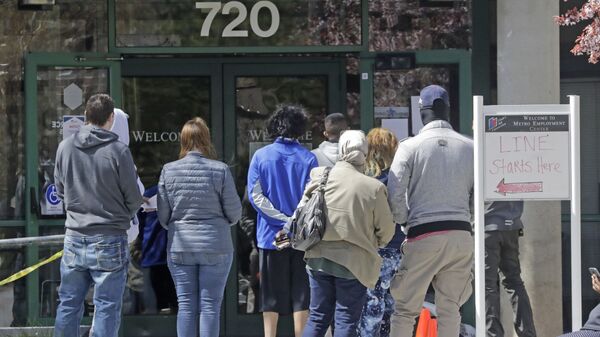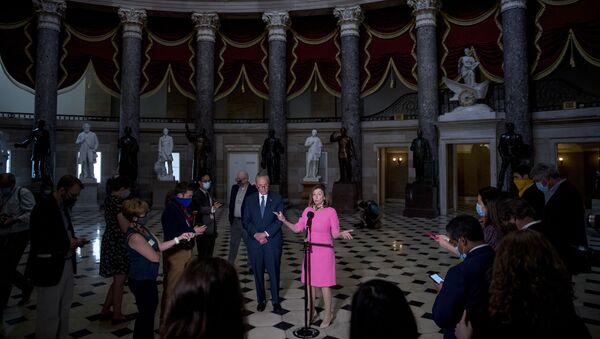The sharp partisan divide on Capitol Hill is once again affecting millions of Americans as Republicans and Democrats are struggling to compromise on another coronavirus rescue bill.
Following a 90-minute meeting in D.C. on Friday, negotiators appeared to have become stuck on several key provisions of the legislation.
What’s at stake?
The overall price tag of the bill is one of the main stumbling blocks. Democrats are pushing for a $3.4-trillion spending package, while the GOP proposal is worth around $1 trillion.
Nancy Pelosi, the Speaker of the House, has proposed cutting the asking price for her proposal by $1 trillion and asked the Trump administration to boost its proposed spending by the same amount.
Senator Chuck Schumer, another Democratic negotiator, has said his party would not accept a virus relief bill that would earmark less than $2 trillion. “I’ve told them, ‘Come back when you are ready to give us a higher number,’” Pelosi told reporters.
In a letter to colleagues, Pelosi has outlined several other critical differences with Republicans.
For instance, Democrats demand $915 billion in aid to states and municipalities, well above the $150 billion proposed by the Senate Republicans. Donald Trump said he had “no interest” in increasing that money.
Pelosi and Schumer only interested in Bailout Money for poorly run Democrat cities and states. Nothing to do with China Virus! Want one trillion dollars. No interest. We are going a different way!
— Donald J. Trump (@realDonaldTrump) August 7, 2020
Democrats also aim to put $75 billion into the testing, tracing and treatment of COVID-19, while the Republican bill includes $15 billion.
Pelosi said the parties are a “couple hundred billion dollars apart” on how much money to allocate for reopening schools. The Republican proposal has specified $105 billion for that purpose; part of that aid would be tied to the schools holding in-person classes.
According to Pelosi, Democrats call for $67 billion to be provided for food, water and utility assistance, while the GOP puts aside only $250,000 for food.
She lamented that Republicans insist on keeping in place their $135-billion tax giveaway for the wealthiest – part of the $2.2-trillion economic stimulus bill passed in March – but reject money for a refundable tax credit for low- and moderate-income working families.
Jobless benefits
Pelosi’s letter notably did not mention jobless benefits, one of the key provisions in any bill that would have to pass.
The $600-per-week boost in benefits, which helped keep millions of jobless workers afloat during the pandemic, expired last month. Democrats have dug in on their plan to extend the payments – which are provided on top of state benefits – at $600 per week through January 2021.
The Senate proposal included an initial $200 weekly subsidy, to be phased out as individual states create new systems to pay laid-off workers 70 percent of their prior pay. The White House has reportedly proposed additional weekly UI payments of $400 through mid-December. Democrats have not budged so far, arguing that the new percentage-based system cannot be adopted quickly in scores of states.

Treasury Secretary Mnuchin said the White House has yet to receive compromise offers on either unemployment insurance or state and municipal relief.
“There’s a lot of areas of compromise,” he told reporters after Friday’s meeting. “I think if we can reach an agreement on state and local and unemployment, we will reach an overall deal. And if we can’t we can’t.”
The two sides, meanwhile, appear to have come to a compromise over extending a federal moratorium on evictions, which expired on 24 July.
Executive action on the table
President Donald Trump, who wasn’t present at the meeting, said he would use his executive power to pass coronavirus relief measures if his administration and Congress are unable to reach an agreement.
Trump said that his pending order would extend the lapsed jobless benefits through the end of the year, continue the eviction moratorium, suspend federal student loan payments (the current suspension expires on 30 September) and impose a payroll tax holiday.
Steve Mnuchin indicated that he would recommend Trump making “some executive actions” as soon as over this weekend.
However, he didn’t outright abandon the negotiations, saying he would “back here any time to listen to new proposals” from Democrats.
It comes as Friday’s jobs report showed that 1.8 million Americans were added back to payrolls in July, a dramatic slowdown from the 4.8 million jobs added in June and 2.7 million in May.
The unemployment rate fell to 10.2 percent, according to the Bureau of Labor Statistics, which is still above the Great Recession peak of 10 percent recorded in October 2009.
“It’s clear the economy is losing steam,” Schumer said on Friday, citing the report. “That means we need big, bold investments in America to help average folks.”


